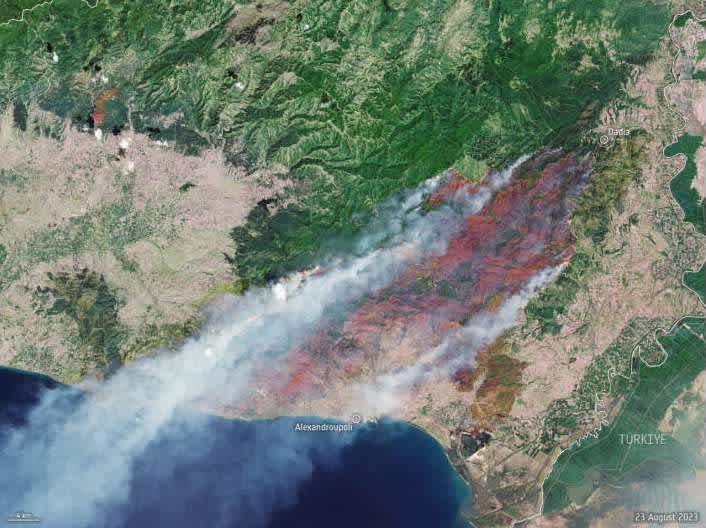Earlier on this year we presented new research at two conferences: Historical Materialism in Athens and Weaving Worlds at TU Delft. We have been examining the ‘control room’ at the Ministry of Migration and Asylum in Athens, a room situated at the centre of a network surveilling the new ‘closed controlled access centres’ primarily based across Greece’s islands. The development of the closed camps evolved out of a reaction to the fire at Moria camp in Lesvos in 2021, which was met by a Task Force for Migration Management. The control room has been designed, as the migration minister Notis Mitarachi has said, to predict threats and prevent similar fires from happening again. Despite this, the summer has proved to be one of the most dangerous for migrants in, and attempting to reach, Greece: exposed to areas of high wildfire risk; extreme anti-migrant nationalists and fascists seeking to harm them by harnessing the fires; and pushbacks resulting in tragedies such as the shipwreck off Pylos, which has to date claimed over 500 lives.
Wildfires, as a consequence of unstable climate – rising heat, dry weather and winds – tore across Greece this summer, particularly affecting the Evros region and the northeastern city of Alexandroupolis. According to Border Violence Monitoring Network’s (BVMN) report on the August fires, 94,800 hectares of land were burned this year in Greece (as of 24th August), ‘with nearly half of the destruction occurring in three days between the 19th and 21st of August’.
More disturbingly, the fires have become a tool for a rising wave of anti-migrant warfare. Far-right nationalists have been reported to be deliberately driving people to, and enclosing them in, the fires – and encouraging others to do the same through social media. These barbaric actions are propelled by a conspiracy that migrants are responsible for the wildfires (some are already being prosecuted for arson), and far-right politicians claiming that civilians are entitled to protect ‘the forests, their property and their country’ by any means, as BVMN has reported.
We are witnessing a rapid acceleration of intersecting crises, where extreme weather feeds extreme politics, and far-right conspiracies fan the flames of climate breakdown. This summer has evidenced how climate catastrophe is increasingly leveraged as another weapon of border violence, and how those displaced by unlivable environments outside Europe are entering into the most dangerously affected areas within it. This newsletter gathers resources that contextualise the extreme meeting points of climate and displacement crises in this contemporary political moment:
